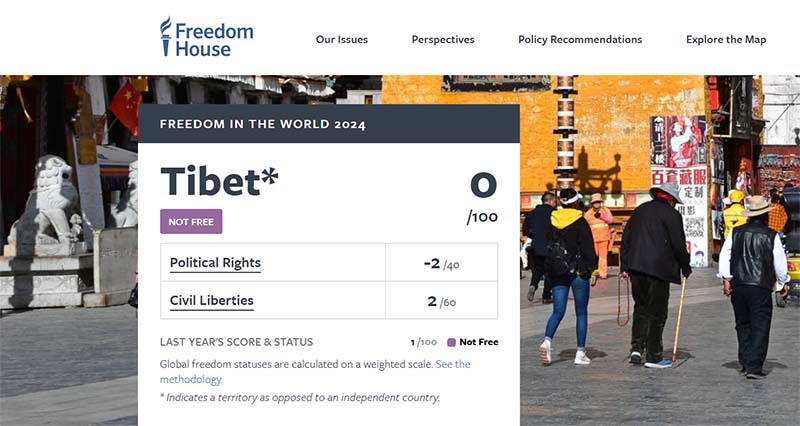Washington, D.C. – The latest "Freedom in the World 2024" report by Freedom House unveiled Tibet as the world's least free country, scoring 0 out of 100 on the Freedom index.
The report highlights Tibet's dire situation, stating, "Tibet is one of the least free places in the world, with an aggregate score even lower than China’s. During 2023, approximately one million Tibetan children were separated from their families and placed into state-run boarding schools where official versions of Han Chinese culture and language are forcibly inculcated."
Freedom House, an independent organization headquartered in Washington, D.C., committed to advancing freedom globally, released its annual report titled "Freedom in the World 2024: The Mounting Damage of Flawed Elections and Armed Conflict" on February 29, 2024. Tibet received a dismal -2 out of 40 for political rights and 2 out of 60 for civil liberties in this report. Contrasting with last year's score of 1 out of 100, Tibet's overall rating plummeted to 0 out of 100 in 2023. Following Nagorno-Karabakh, which scored -3, and Syria, which scored 1, Tibet claims the unenviable title of the least free country, marking the worst grade in years and topping the list since 2015.
Freedom House identified 67 countries and territories as lacking freedom, with the 15 poorest performers in political rights and civil liberties. Among these, Nagorno-Karabakh ranks as the least free region globally with a score of -3, followed by Tibet at 0, and Syria at 1. China, with an overall score of 9 out of 100, received -2 for political rights and 11 for civil liberties.
The report "Freedom in the World 2024: The Mounting Damage of Flawed Elections and Armed Conflict" observes, "People residing in disputed territories without access to self-determination remain especially vulnerable to abuses by unchecked authorities. Beijing's ongoing suppression of the limited freedoms in Hong Kong and Tibet persists."
Regarding Tibet, the report emphasizes, "The CCP fiercely safeguards its political monopoly, harshly punishing any advocacy for self-determination. Beijing has long encouraged Han Chinese settlement while coercively relocating hundreds of thousands of ethnic Tibetans into programs focused on reeducation, resettlement, or employment, all saturated with political indoctrination. This concerted effort aims to Sinicize the region and eradicate Tibetan identity, rendering Tibet one of the world's least free places. In 2023, around one million Tibetan children were forcibly separated from their families and enrolled in state-controlled boarding schools, where they are compelled to adopt Han Chinese culture and language."
"The nominal representation of ethnic minority groups like Tibetans, Uyghurs, and Mongolians in administrative roles and governmental bodies such as the NPC remains largely symbolic," the report adds. "Chinese authorities aggressively pursue policies to manipulate the demographics of ethnic minority regions, notably in Xinjiang, Tibet, and Inner Mongolia."
Freedom House underscores, "A rising number of ethnic minority children in Xinjiang and Tibet experience forced separation from parents to attend state-run boarding schools, where Mandarin serves as the sole language of instruction, coupled with intense political indoctrination. Protesters face detention and punitive measures. The Ministry of Education's mandate for preschools nationwide to teach exclusively in Mandarin reflects the ongoing drive to enforce Mandarin as the predominant language across all education levels, further undermining the cultural identities of ethnic minority groups and individuals. Meanwhile, a sustained campaign of detentions and lengthy prison terms targets ethnic minority intellectuals, artists, musicians, and religious figures, severely undermining the cultural, religious, social, and economic fabric of these communities."
"The Chinese media environment ranks among the world's most restrictive, supported by an intricate censorship system, particularly online. The CCP exercises control over news reporting through direct ownership, journalist accreditation, severe penalties for criticism of party leaders or the CCP, and daily directives to shape media coverage of current events," the report concludes.


![Tibet has a rich history as a sovereign nation until the 1950s when it was invaded by China. [Photo: File]](/images/stories/Pics-2024/March/Tibet-Nation-1940s.jpg#joomlaImage://local-images/stories/Pics-2024/March/Tibet-Nation-1940s.jpg?width=1489&height=878)


















